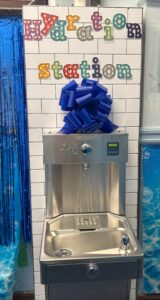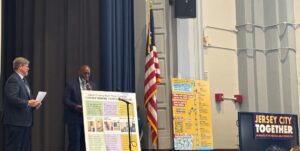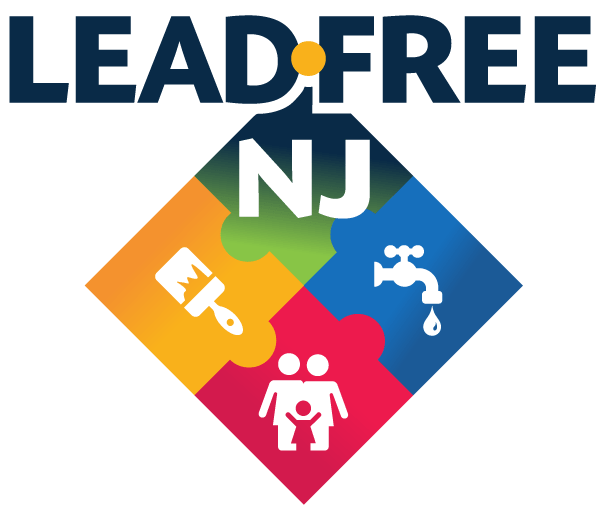Partnership and Persistence Improve Access to Drinking Water in Jersey City Schools
By Nikki Baker, Healthy Schools Now & Cassie Bolinger, Lead-Free NJ
New drinking water fountains have been installed in every Jersey City public school and early childhood center; providing safe, lead-free drinking water to over 27,000 students and staff.
Backbone staff supporting the collaboratives Healthy Schools Now, Lead-Free NJ, Jersey Water Works, and Sewage-Free Streets and Rivers attended the “Clean Water Celebration” on March 20 to recognize this achievement, organized by Jersey City Together and the Jersey City Public Schools. Jim Nelson, a member of the collaboratives named above and co-chair of Jersey City Together, was instrumental in the success of this achievement.


Impact of Drinking Water Access on Students
Over ten years ago, in 2008, some drinking water fountains in Jersey City schools began to be shut off due to lead contamination. Over the years, more fountains were turned off without a plan to turn them back on. Instead, bottled water was brought into the schools.
contamination. Over the years, more fountains were turned off without a plan to turn them back on. Instead, bottled water was brought into the schools.
During the “Clean Water Celebration”, alumni Harshal Agrawal recalled that teachers instructed him to never drink from the school water fountains. Agrawal experienced the health and safety risk of this limited access to clean drinking water most acutely when the bottled water supply ran out at the moment he needed it most – after a physically demanding soccer practice. This experience motivated Agrawal to join efforts advocating for access to drinking water in the schools.
Ultimately, these advocacy efforts were successful, as new drinking water fountains have been installed to provide clean water at all schools. During the “Clean Water Celebration,” fourth grader Stella Benito expressed her gratitude for this project, stating that:
“it means a lot to know that our leaders are making choices to make us safer in order for us to do better in school.”
Collaboration
Getting to this moment was a feat of local collaboration. Funding was sourced from Jersey City Municipal Utilities Authority, the Jersey City Board of Education, and state Securing Our Children’s Future Bond Act administered by the NJ Department of Education, for a total project cost of more than $17 million. Starting in 2019, this work took nearly six years to complete.
The Power of Persistence and Advocacy
Throughout those six years, Jersey City Together, a local advocacy group, led the charge to push for the project’s completion. Co-chaired by Jim Nelson and Rev. Dr. Alonzo Perry (pictured below), the group held local officials accountable by requesting information about the progress, elevating student and staff impact stories, and garnering public support. You can learn more about their advocacy and the histor y of this project here.
y of this project here.
“Water is life” spoken for generations by Indigenous communities, proven by science, and echoed by Reverend Dr. Alonzo Perry while giving the invocation at the “Clean Water Celebration. Safe, clean drinking water is not a luxury- it is a basic human necessity. Yet in 2025, we are still fighting for what should be guaranteed: clean, safe water for every community and access in every school and childcare center.
Advocacy is the never-ending struggle. We may not reinvent the wheel of advocacy work, but we can use prior efforts as guidance to spark continued change.
What are some solutions we can implement to advocate for safe drinking water?
- Assess the local situation: What is happening in my community and/or my school or school district with respect to clean drinking water? What do I want to see change?
- Be informed: Research your state’s action level for lead (measured in milligrams per liter of water). Remember: there is no safe level of lead—period. Check your school district’s website for lead testing results. Identify schools and childcare centers facing lead-in-water issues. How many drinking fountains are shut off? How many are functioning in each school? Are there filtered fountains? Is there a safe alternative water source available? How accessible is safe drinking water for all students?
- Know who’s responsible: Who is in charge of record keeping, data tracking, and sharing information with parents, guardians, and the broader community?
- Ask questions: Attend board of education meetings, city council meetings, and environmental agency hearings. Speak directly with your elected officials. Call, email, and follow up on your concerns.
- Build community power: Join groups or coalitions working on the same or related issues. There is strength in numbers.
- Prioritize health: Get tested for lead exposure—both for yourself and your loved ones.
Join us!
https://www.leadfreenj.org/become-a-member/
https://njwec.org/take-action/campaigns/healthy-schools-now/
